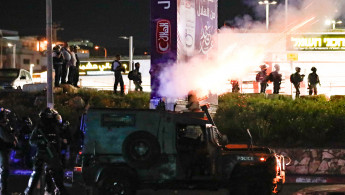Israel won't compensate '48 Palestinian towns for damage caused in 2021 protests: report
Israel will not be paying compensation to fully Palestinian towns in its territory that suffered damage during protests last year, according to reports - despite approving such payments for towns with mixed Israeli and Palestinian populations.
In May 2021, Palestinians living within Israel's 1948 borders protested Israeli violence against Palestinians in the occupied territories.
That month, the Israeli state was pummelling the besieged Gaza Strip in a bombing campaign that killed more than 250 Palestinians, and violently suppressing protests against forced expulsions in occupied East Jerusalem.
Some protests in Israeli towns with a sizeable Palestinian population became riots, causing damage to public buildings and private property and confrontations with police, who fired bullets and stun grenades at crowds and conducted mass arrests.
In the wake of the damage, local authorities asked the finance ministry's Tax Authority for compensation for the damage caused to public property, in accordance with Israeli law.
The state agreed to requests submitted by the municipalities of the mixed Jewish-Arab cities of Lod (Lydda), Ramleh and Acre, but rejected damage compensation requests from Umm al-Fahm, Rahat, Tira and the local councils of Nahaf, Rayna and Deir Hanna, Haaretz reported Wednesday.
Israel's refusal to pay up for damage repairs has sparked anger among '48 Palestinians, who hold Israeli citizenship but say they have been systemically neglected by Tel Aviv.
"We call on the government to immediately start remedying this injustice that discriminates against the Arab public. We are prepared to fight this and any other injustice toward us by the government," Mudar Yunas, a lawyer and the chairman of the National Committee for Arab Local Authority Heads told Haaretz.





 Follow the Middle East's top stories in English at The New Arab on Google News
Follow the Middle East's top stories in English at The New Arab on Google News


